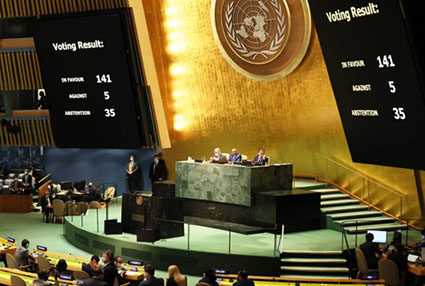Special to WorldTribune.com
Russia has suffered a stunning political setback from the United Nations as Vladimir Putin pursues his ruthless attack against Ukraine. The diplomatic rebuff came amid Moscow’s widening military aggression on Ukraine which has created widespread civilian casualties and triggered a tragic refugee exodus from the East European country.
In a rare Emergency Special Session of the UN General Assembly, one of eleven held since 1950, the organization’s full 193 membership weighed in on the Kremlin’s widening war against Ukraine’s territorial sovereignty and demanded an immediate halt to Russian military operations and a withdrawal of Russian troops from Ukraine.

The vote tally on a tough resolution “Aggression against Ukraine,” was 141 to 5 with 35 abstentions. Though highly symbolic but not legally binding, the Assembly vote stings Russia with the moral and political shame for its unprovoked invasion.
Backers of the resolution included the United States, Canada, all of Europe, and most of Latin America and Asia. Only four states backed Russia; Belarus, Syria, Eritrea and North Korea.
Many of the “usual suspects” who can usually be relied on to support Moscow in such a vote included China, Cuba, Nicaragua and Sudan were among the 35 abstentions. Other abstentions included India, Pakistan and Iran.
Ukraine’s UN Ukraine’s Amb. Sergiy Kyslytsya stated of the Russian forces: “They have come to the Ukrainian soil, not only to kill some of us … they have come to deprive Ukraine of the very right to exist.”
President Volodymyr Zelensky warned, “Russia is aiming to erase Ukraine, its history and people.”
But the embattled president has by chance and clearly fate become the proud symbol of free and fighting Ukraine. His words and more importantly his actions have galvanized his nation, and defiantly prepared it for this David vs Goliath confrontation.
Putin and his forces are carrying out war crimes with appalling Soviet-style ferocity to subjugate Ukraine. We are clearly facing real-time evil in Europe from a nuclear-armed rogue regime.
Now Ukraine braces for the whirlwind of the Russian onslaught.
Already Moscow’s devastating attacks on Ukrainian cities and civilian targets constitute war crimes and should be referred to courts in the Hague.
The Irish Foreign Ministry added, “Along with 37 other concerned states, Ireland will now formally refer the situation in Ukraine to the International Criminal Court.”
Yet, Moscow’s military may have miscalculated; the Russians expected a quick shock and awe blitzkrieg which failed to gain momentum. Ukrainian forces, many with combat experience in Russian’s ongoing dismemberment of Ukraine since 2014, have stalled and blunted the momentum of the attack, at least for now.
Sadly, despite Ukraine’s predicament, Washington is well advised keeping American troops out of the conflict nor extending a No Fly Zone over the disputed region.
Significantly, the Ukrainians have the will and the courage to fight in epic but uneven battles not seen since Hungary in 1956.
Recalling the October 1956 Hungarian Revolution, the freedom fighters initially and surprisingly defeated Soviet garrison forces in the country. But their exuberance soon turned bitter ten days later in early November as massive Soviet military forces streamed into Hungary from Ukraine.
The Hungarians fought bravely, but the sheer numbers and brutality of the Russians broke resistance and subdued a sullen land to Soviet communist rule.
Massive numbers of refugees fled, and Hungary lost some of its most talented people.
Viewing the conflict’s humanitarian angle, already more than a million of Ukrainian refugees and foreigners have fled from the widening war. Neighboring Poland, Hungary and Slovakia have helped ease this humanitarian wave with offers of food and shelter.
UN Secretary General Antonio Guterres warned, “The brutal effects of the conflict are plain to see. But as bad as the situation is for the people of Ukraine right now, it threatens to get much, much worse. The ticking clock is a time bomb.”
He’s right. While Putin’s invasion has united NATO and the Europeans as never before in the modern era, its consequences confront Europe with serious security, humanitarian and energy supply questions, given it’s dangerous dependence on Russian gas and oil.
While American and European economic sanctions have squeezed Russia’s economy, why hasn’t Moscow’s lucrative energy sector been subject to embargoes?
Moreover, why is the USA still now importing 710,000 barrels of oil per day from Russia?
Both disgust over the war and pain from the economic sanctions may slowly begin to take effect in Russia.
Putin faces domestic discontent, discord and political rumblings. A Pyrrhic victory for Moscow in Ukraine may change Putin’s fortunes in Russia itself. Darkness is descending.
John J. Metzler is a United Nations correspondent covering diplomatic and defense issues. He is the author of Divided Dynamism the Diplomacy of Separated Nations: Germany, Korea, China (2014). [See pre-2011 Archives]

 By
By